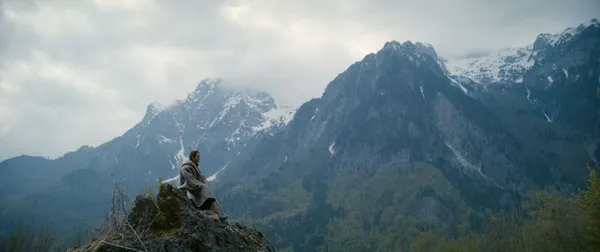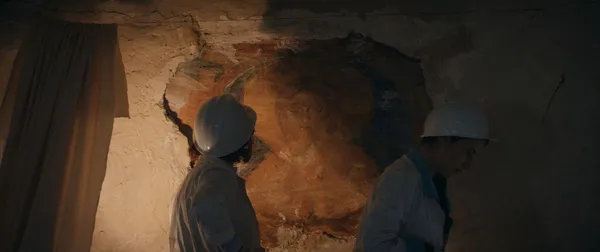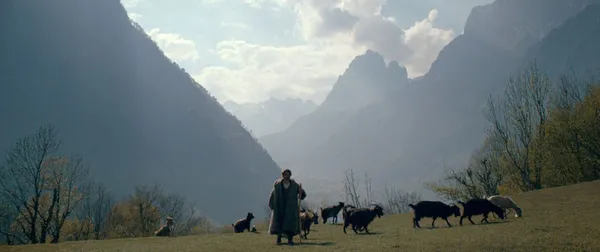 |
| Arben Bajraktaraj as Besnik in A Shelter Among The Clouds. 'We filmed almost in chronological order - which is a luxury for an actor' Photo: Pluto Film |
Robert Budina's visually arresting and thoughtful A Shelter Among The Clouds, has the quality of a parable about the need for tolerance and understanding as it tells the story of Besnik (Arben Bajraktaraj), a goatherd who lives in a remote village in the Albanian mountains. Suffering from seizures and carrying the weight of his past, he leads an almost monastic existence with his father. His way of life is challenged when he discovers the mosque in his village used to be a Catholic church, a revelation that brings interest from a city art historian Estela Pysgyli and local conflict at the same time as his brother and sister arrive to help him with his ailing father - and begin to jockey for position as his heir.
The film has a spiritual sweep that focuses not on a single religion but on ideas that are rooted in humanism. The director and his star - who is perhaps most famous to audiences for his role as Death Eater Antonin Dolohov in the Harry Potter franchise - sat down with the press when the film screened in competition at La Mostra in Valencia to talk about the inspiration behind it and some of its themes.
Budina - who was born in Albania but left for Italy on a seized ship in 1991 (a fascinating tale of migration which you can hear more about over at the target="_blank">BBC) begins by explaining that much of the tale is rooted in fact.
He said: "There is something real that happened in Albania 400 or 500 years ago when, during the Ottoman Empire, a church was converted into a mosque. And the Muslims of a little town in Albania, they asked the vizier of the time to divide it between them, because Albanian families were mixed at that time - so one brother was Muslim, the other Catholic. So they decided that they would use it for one day a week for Catholics and six days a week for the Muslims. That's a real textbook story."
The director - who wrote the screenplay with Sabina Kodra - went on to explain that even before Communism, religion was a very mixed thing in Albania, with family members often belonging to multiple faiths.
Bajraktaraj, an Albanian from Kosovo who has made his home for a long time in Paris, added: "All the tribes you see in the northern mountains have the same blood line. So, for them, it's more important to be part of the bloodline than the religion line. There is always supremacy of bloodline over religion. That's why you have brothers living in the same house. I'm quoting a priest, who was travelling around this region and who was in the house where one person was Catholic and another was Muslim - it's not an abstract thing.
 |
| Robert Budina: 'You need to transmit to the people, not something that is only for believers but something that is universal' Photo: Pluto Film |
"While shooting, in the same mountains, it was Easter time and we were in the Shala tribe. One of the guys was celebrating Easter and all of the Muslims in the village - who are from the same tribe - would go and share the feast all together. It happened during the shooting - it was not 500 years ago."
These themes are present in the film, as Besnik tries to encourage the local religious communities to share the single building. In fact, he finds he has more trouble on the home front as his Muslim sister Fitore (Irena Cahani) and Orthodox brother Alban (Osman Ahmeti) find themselves increasingly at odds over faith. Speaking about the Holy Fool aspect of the character, Budina said: "He's someone who suffered for the others. He gives his whole world to the others. He held nothing back but in the end he has a light inside that never went out. It's me inside this kind of character, it's the struggle of my life. Sometimes hate is much more stronger than love and division is much stronger than being united."
He added: "The film is something personal, because I am an Orthodox, non-believer and my wife, who is a producer of the film, is a Muslim. One day, our teenage kids asked, "What are we?" The second reason for making it is because up in those mountains is a house of God and the third reason, is Charlie Hebdo. I want to transmit the message that it is not the religions that divide people, but the people who use the religions for politics."
The director takes a collaborative approach to his work with actors - something that Bajraktaraj welcomed. Budina said: "I just design the main ideas and the details I leave to the actors. So I collaborate with the actors, leaving everything open, and discover another dimension that I can't know when I write the script. The actor is the last one who writes the dialogue, in a way. I know the main role but the details are always for the actor. This is my way of working."
Bajraktaraj added: "It's the most exciting way of working. It's more interesting because there's more uncertainty. I'm not going to know precisely what I'm going to do but there was another advantage for that. We talked a lot before we created and in the beginning I was insisting for the character not to talk at all and Robert wasn't sure about that and I think he was right, because that way the character would be too heavy and you would lose the empathy for him. It's not important if he talks or he doesn't talk, he's carrying that pain from the past. We filmed almost in chronological order - which is a luxury for an actor."
Even though the old adage says you should never work with children or animals - it turns out that goats are naturals when it comes to performance.
"We were one day shooting in the mountains with the goats and two weeks working together," said Budina. "Goats are very intelligent animals and they understood from the beginning, so we saved two days of shooting.
 |
| Arben Bajraktaraj: 'It was kind of harmony between goats and actor, so we finished the movie two days before schedule, thanks to the goats' Photo: Pluto Film |
Bajraktaraj added: "I spent eight years of my childhood doing herding but it was not with goats, I worked with cows. So, I spent a day with the goats and, frankly, the first take when my character was praying and then I was supposed to call the goats, well, I was surprised - they just followed me. I was walking and surprised because they were pushing me forward. Almost every scene is just one shot. It was kind of harmony between goats and actor, so we finished the movie two days before schedule, thanks to the goats."
And Budina says that shooting the movie had a profound personal affect on him. He said: "There I discovered another dimension of my life in the mountains that I didn't know before. Time doesn't exist there and you have the time to reflect and go deeper in your feelings.
"I'm not someone who is interested in religions - but about he spiritual world? Yes. I think everyone is. So you need to transmit to the people, not something that is only for believers but something that is universal. That's why I wanted to use the religion but not to speak about the religion, but to speak about the human being and his relationships. The relationships we have with nature, family, God, between ourselves, this was my main goal."





















